My curiosity about this large patch of greens fronting Manila Bay is always piqued every time I see it from a window of a plane whenever I fly into or out of the city. It stands out as an oddity in a cityscape chockfull of concrete.
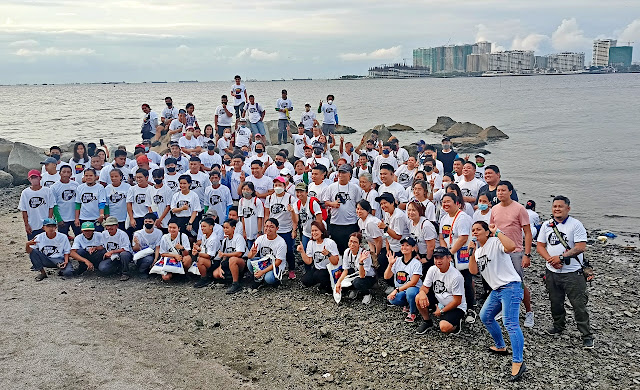 |
| Some of the cleanup volunteers poses for a group photo |
I would see flock of birds soaring over the forested part and I'd notice how the coastline wind away from the towering buildings along Roxas Boulevard. Seeing it from above fills me with both delight and foreboding. The former provides comfort in knowing that green places still exist in Metro Manila, while the latter inspires dread at the prospect of imminent development eating it up anytime now.
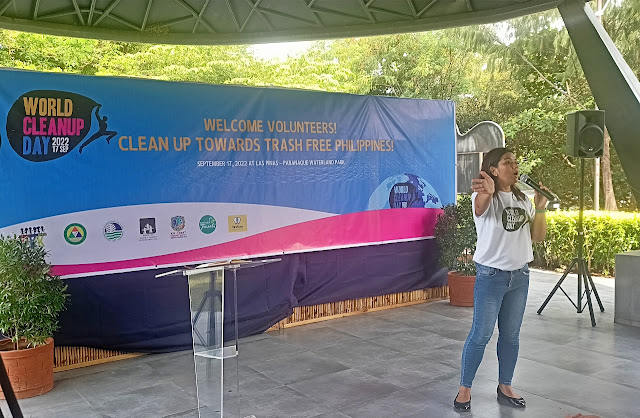 |
| Ann Marie Cunanan of Meaningful Travels PH briefs the volunteers |
It turns out, as I later discovered, that part of the nature oasis located in Metro Manila's urban jungle is the 175-hectare protected Las Piñas - Parañaque Critical Habitat and Ecotourism Area (LPPCHEA). Through Presidential Proclamation 1412, issued on 22 April 2007, this wetland park became the first critical habitat established in the country.
 |
| Various tree species are properly labeled around LPPCHEA |
I would hear more about LPPCHEA from bird photographers, cyclists, and other nature enthusiasts, and each time my fascination about this outdoor haven grew. Finally, after several ditched chances of visiting the place, I finally set foot LPPCHEA when I joined Meaningful Travels PH and other volunteers during the 2022 World Cleanup Day
Nature Habitat in the City
Serving as conservation model for the wise use of mangrove forests and other wetland areas, LPPCHEA also acts as a habitat for migratory birds and a natural sea barrier. The center is also used to educate the general public about the importance of wetlands.
 |
| A healthy mangrove forest can be found in LPPCHEA |
Long Island, in the southwestern part and Freedom Island, in the northeastern part of the LPPCHEA in Paranaque City, are the two primary landmasses that make up the Las Piñas - Parañaque Critical Habitat and Ecotourism Area. The majority of LPPCHEA is made up of mudflats where a mangrove forest grows to over 30 hectares but it also features brush, grassy knolls, and a rocky and sandy shoreline.
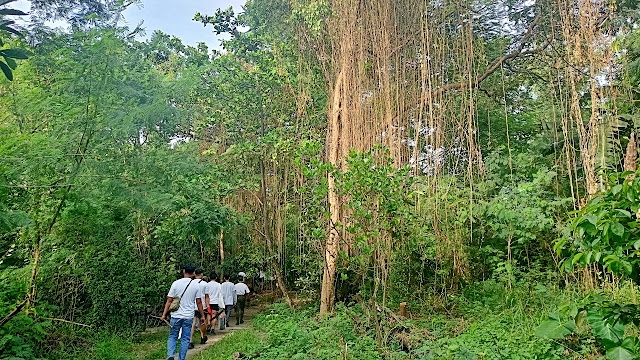 |
| A nature habitat in the urban jungle |
Easily accessible and home to a wide variety of bird species, LPPCHEA is a popular spot for birdwatchers. According to a wildlife survey, there are more than 82 species of wild birds, 41 of which are migratory, that can be spotted here. During low tide, many wildlife species grazes on the exposed invertebrates. Countless migratory birds escaping the treacherous Siberian winter makes a pit stop here to rest and replenish.
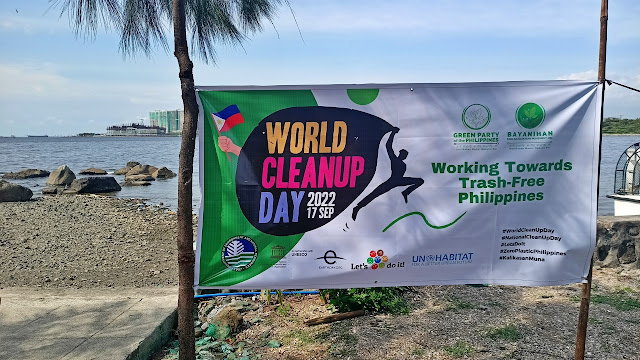 |
| Let's work towards a trash-free world |
The peak of migratory season happens in the months of August to April, when LPPCHEA serves as nature abode to more than 5,000 birds on a daily basis. Bird photographers would often capture endangered species like the Chinese Egret and Siberian Ruby-Throat, and the common ones like the Little Egrets, Moorhens and Black-Crowned Night Herons just to name a few.
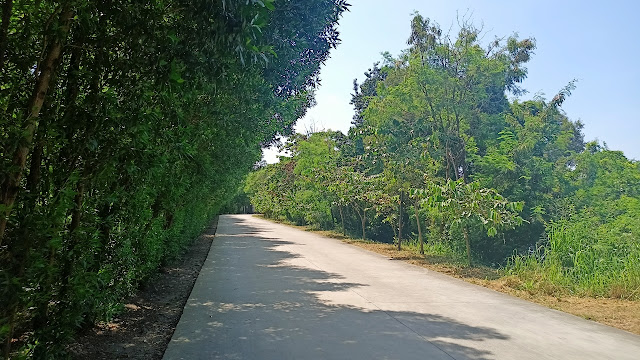 |
| LPPCHEA is a bird's paradise |
LPPCHEA is also home to our own endemic bird the Philippine Duck — which is included in the International Union for Conservation of Nature and Natural Resources list of "vulnerable species". The Philippine Bulbul and the Colasisi are the other two indigenous birds that nests in LPPCHEA.
2022 World Cleanup Day
Also known as the International Coastal Cleanup Day, this worldwide initiative was started in 1986 by the Ocean Conservancy and a coalition of international volunteer organizations. Since then, various governments around the world including our own, through Presidential Proclamation # 470, have declared every third Saturday of September as World Cleanup Day.
 |
| Collected trash courtesy of the morning batch of volunteers |
As volunteers swarm shorelines across the country, I opted to join volunteers from Meaningful Travels PH, 2KK Tulong sa Kapwa Kapatid Foundation, 1Filipino Foundation, Philippine Army's Civil-Military Operations Regiment, the Jaime V. Ongpin Foundation, KG-CERT, WeGen and the CSR department of Philip Morris Philippines, in their coastal cleanup at LPPCHEA.
 |
| Trash from all over Manila are washed here |
After we were briefed by Ann Marie Cunanan of Meaningful Travels PH on the process of the coastal cleanup, us volunteers numbering to almost a hundred were grouped into fives and separated into two units with the first one heading straight to the shore for the cleanup while the other were taken on a tour of the mangroves to avoid over-crowding.
 |
| The 114 hectares of mudflats that surround mangrove areas provide a daily food source for an estimated 5,000 birds. |
I was surprised by the expansive mangrove forest said to be home to around 8 species of mangrove trees. A wooden boardwalk overgrown with mangrove leading almost a kilometer to the other end of LPPCHEA make up for a scenic and calming walk.
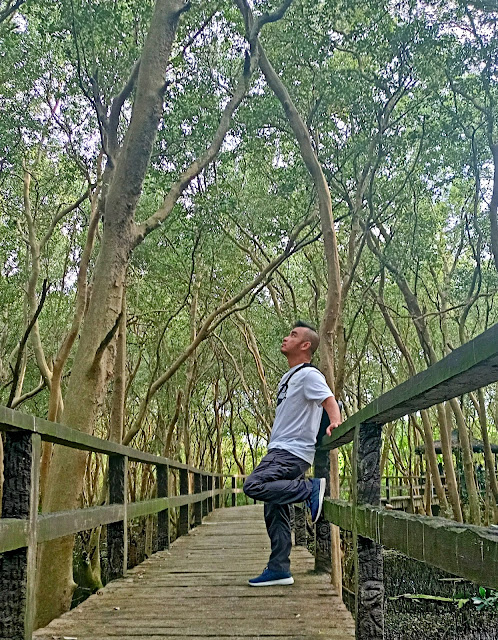 |
| I had a fun nature walk here |
After our sightsee, we wasted no time and made our way to the shoreline to do our part in cleaning up the garbage that washes ashore at LPPCHEA. Immediately, sacks and sacks got filled up with all kinds of trash: rubber slippers, plastic bottles and sachets, containers, rubber, pieces of wood, metal parts and so on. Basically, almost all kinds of materials that floats on the waters of Manila Bay.
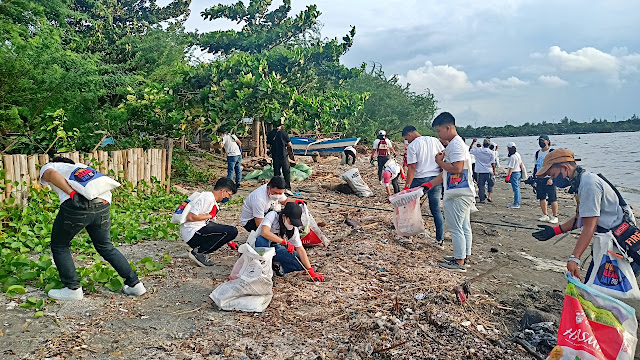 |
| Sacks got filled up in a hurry |
I estimated our afternoon's cleanup scooped a week’s worth of garbage swept ashore, thus requiring a coastal cleanup to be done frequently unless we collectively start addressing the underlying cause of the problem: improper waste disposal and management.
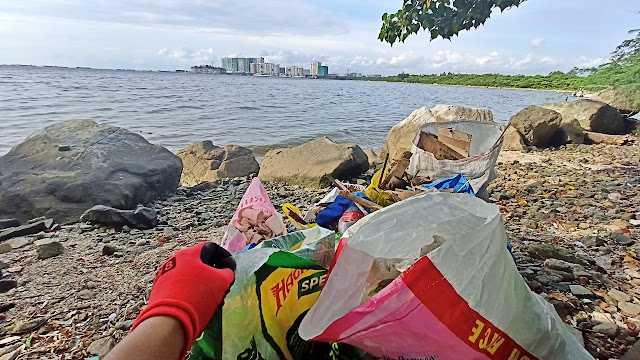 |
| Rubber gloves were distributed for easy pickings |
Dealing with the root of the problem may seem like an insurmountable effort for now, but as we’ve come to realize that by simply focusing on our own consumption, we can make significant progress. We can all do our part to speed up the process of solving our trash problems by increasing our use of recyclable items and practicing proper rubbish disposal.
 |
| The "Pickers" takes a short break for a Groufie |
As the sun sinks majestically beyond the horizon of Manila Bay, I look around and see a flight of birds flying overhead. Even though I am in a metropolitan city of over 20 million people, I am surrounded by verdant flora that makes me feel like I am in the last natural frontier. The importance of LPPCHEA as a refuge for migrating birds and other species serves as a gentle reminder to humans to take better care of Earth so that future generations will have a more pleasant and habitable planet to share with all its inhabitants.
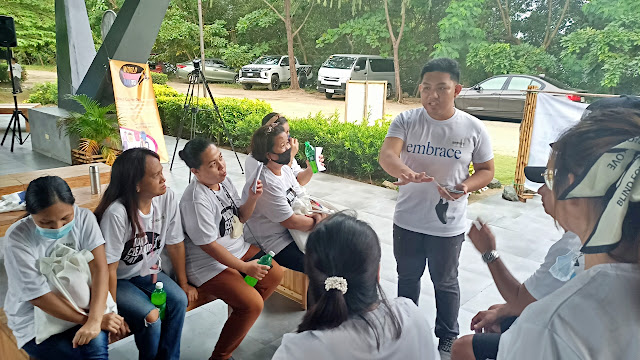 |
| The groups had their quick post-cleanup reflection as part of the program. |
Educational visits especially for groups is encouraged but first, you need to email them for assistance.






















